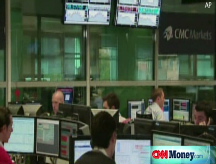Risk aversion lifts dollar
Currency traders flock to the greenback's perceived safety as global recession fears dominate markets.
NEW YORK (CNNMoney.com) -- The U.S. dollar continued to advance Thursday as fears of a global economic recession drained the market of its appetite for risky trades involving the euro and the pound.
The euro slid to a fresh two-year low of $1.2727 early in the session before rebounding to $1.2850, up slightly from $1.2832 late Wednesday in New York.
Britain's pound sank roughly 1% to $1.6122. At one point, the pound traded at $1.6044 - its lowest level since September 2003.
Meanwhile, the dollar lost ground against the Japanese yen. The yen dragged the dollar to ¥96.54, down from ¥97.71. At one point during the session, the U.S. currency slid to ¥96.49, approaching a 13-year low against the yen.
The yen, like the dollar, is a traditionally low-yielding currency that investors flock to in times of economic uncertainty. Conversely, the euro and the pound, which are considered more risky, usually fall when markets are in turmoil.
"It's the flight to quality, to safety," said Gareth Sylvester, senior currency strategist at U.K.-based foreign exchange brokerage HiFX.
The currency market has taken its cues recently from world stock markets. Currency traders say the dollar will continue to outperform its rivals, with the exception of the yen, as long as equity markets remain shaky.
"Equity markets are the strongest barometer for the outlook of the global economy," Sylvester said.
Given the ongoing volatility in world stock markets, the outlook for the global economy is grim.
"We are poised on the brink of a global recession," Sylvester said. "And that is reflected in the currency market."
The dollar's gains also stem from a perception that economic recovery will first emerge in the United States as the government's bailout efforts begin to take effect.
Stocks in Europe and Asia fell Thursday amid deepening fears of a global recession. In Tokyo, the Nikkei fell as much as 7% but pared some losses to end the day 2.5% lower.
Meanwhile, U.S. stock prices were also lower in rocky trading as investors remained concerned about the fallout from the credit crisis and weakness in the global economy.
Investors have closely watched the lending markets for signs that the credit crisis is easing. Bank lending rates were largely unchanged overnight after having declined significantly during the last few weeks. ![]()



